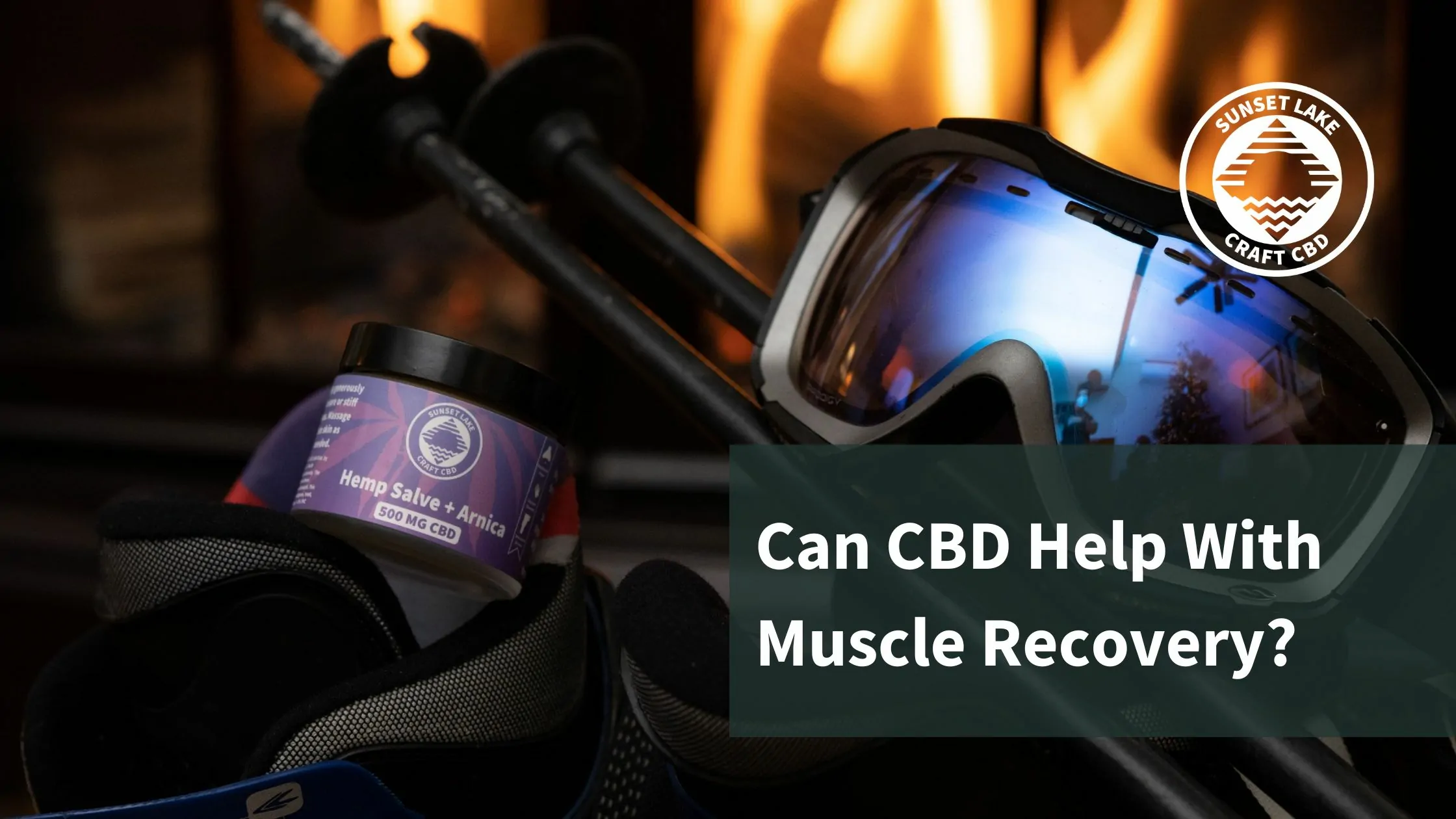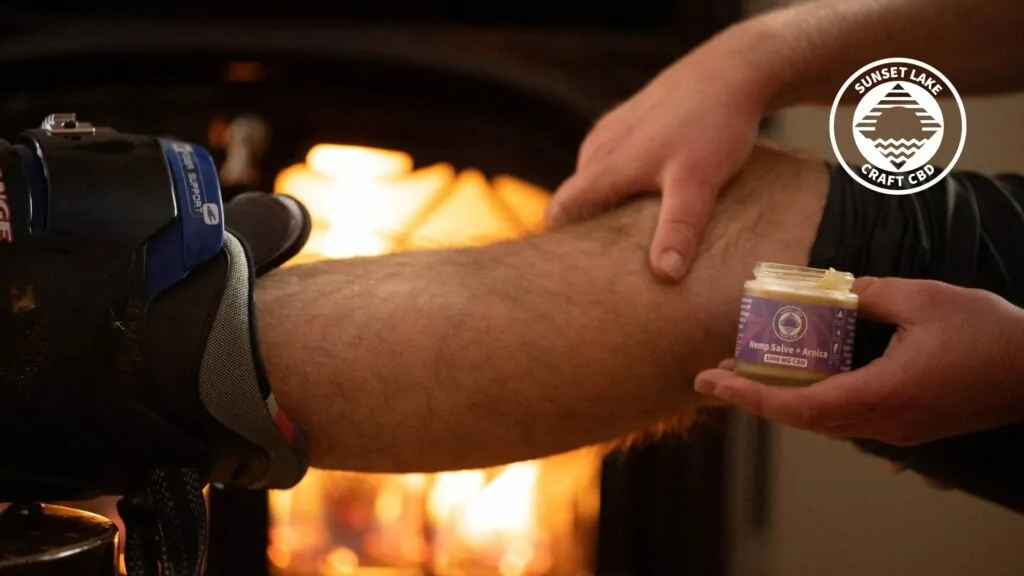No products in the cart.
CBD After Exercise: Can It Help With Muscle Recovery?

You hit the gym, go to bed, and wake up the next day with sore, stiff muscles. Those deep aches are a telltale sign of an intense workout. But they can also prove to be a real pain, and in some cases impact your mobility. It’s led many, even professional athletes, to wonder if there’s anything they do or take to lessen the soreness and improve their recovery. Some sports medicine is now studying hemp hoping that CBD can help with muscle recovery.
In this post, we’ll cover muscle recovery, what causes muscle aches, and talk about whether or not CBD can help with muscle recovery.
What Is Muscle Recovery?
During a hard workout, you put stress on your muscles and sometimes push them to failure (the point at which you can’t do another repetition with the correct form.) When you push to failure, you damage and inflame your muscle fibers.
Muscle inflammation triggers your body’s immune response which repairs the damage to ensure that you can handle greater muscle stress in the future. That’s why as you progress on your fitness journey, you’ll need to subject your muscles to greater stress like heavier weights to see results.
While your muscles are inflamed, it’s common to experience soreness. This is your body’s signal to you that your muscles are under repair and that you’ll need to fully recover before you can train them again.
What Is CBD?
CBD is one of the more than 100 naturally-occurring compounds produced by the hemp and cannabis plant. CBD is not psychoactive and will not make you feel intoxicated.
As of this writing, there aren’t many FDA-backed studies about CBD’s effects on humans, though there is an FDA-approved drug, Epidiolex, that’s derived from CBD to manage rare forms of epilepsy.
Can CBD Help With Muscle Recovery?
To an avid gymgoer, there’s nothing as deflating as an unscheduled rest day because of lingering soreness. If only there was something out there that could help hasten your recovery.
CBD may be just the thing. According to a 2021 review in Frontiers of Physiology, “[CBD] seems to have anti-inflammatory, neuroprotective, analgesic, anxiolytic, and pain-relieving properties which can be potential mediators of recovery in athletes during regular training…”
It should be noted here that all of the following research and citations to said research are not FDA-approved and should not be considered medical advice or a statement of fact.
Inflammation
Inflammation is your body’s immune response to an irritant. Regarding muscle recovery, inflammation happens when you stress and break down your muscle tissue in an attempt to grow new muscle fibers. In some cases though, your immune system can go overboard and clean out healthy tissue around the recovering muscle.
Some athletes supplement their recovery with ingestible and topical CBD. One athlete who touts CBD’s benefits is Megan Rapinoe of USWNT fame, “When [CBD’s] taken after hard training and before bed, I feel it gives me a better night’s sleep and I feel like I’m able to relax a bit easier.”
CBD’s Anti-Analgesic Effects
A few non-FDA-sanctioned studies have found that CBD used in conjunction with THC, also known as full-spectrum CBD has been used to effectively manage pain. While not FDA-approved yet, it seems that American Adults aren’t waiting. 60% of Americans who use CBD are taking CBD for their pain-relieving effects.
Rest is a big part of muscle recovery. Good rest can be tough to come by when you’re in pain. Some athletes (and non-athletes) use topical products infused with CBD to mitigate their surface-level muscle and joint pain to let their body’s internal repair system get to work faster.
CBD and Sleep
We already have a full piece about CBD and sleep that you can read here. But when it comes to muscle recovery, nothing is better for you than sleep. CBD may help by putting you to sleep faster and helping you stay asleep through the night.

How Can You Use CBD For Muscle Recovery?
How you take your CBD for muscle recovery is important depending on what your goal is. Regarding muscle recovery, you may want to try two different methods in tandem with each other.
Topical CBD
Topical CBD can be a topical product like lotion or a rub that’s infused with CBD. They will often contain ingredients that are also good for your skin. You would want to use topical CBD in areas where you have localized soreness.
For example, if you notice that you have delayed onset muscle soreness (DOMS) in your quads after squatting, rub some topical CBD on the areas of acute soreness to help calm the nerves.
CBD Oil
If rest is your goal, try ingestible CBD oil. As opposed to topical CBD’s localized relief, taking CBD oil orally is going to help you relax and if taken before bedtime, CBD oil may even help improve the quality of your sleep.
You can use both topical CBD and CBD oil together depending on your needs.
Muscle Recovery: Is CBD Worth It?
When it comes to muscle recovery, optimization, and strength training, CBD isn’t a magic pill that turns you into an unstoppable force. It’s merely a part of the hemp plant that many have used to help with sleep, stress relief, and pain management.
It can be a bit challenging to find what CBD is right for you. If you plan on taking CBD oil we recommend starting with 25mg daily, for two weeks straight. Learn how your body responds and adjust your dose accordingly. Again, CBD isn’t going to speed up your muscle recovery, but it may just help you relax while your body puts itself back together.
If you’re new to CBD, consult your doctor and ensure that it’s not going to interact negatively with any of your existing medications.
Sources
- Rojas-Valverde, Daniel. “Potential Role of Cannabidiol on Sports Recovery: A Narrative Review.” Frontiers in physiology vol. 12 722550. 3 Aug. 2021, doi:10.3389/fphys.2021.722550
- Mikulic, Matej. “Leading reasons why U.S. adults use cannabidiol as of 2022.” Statista. 22 Aug. 2022. https://www.statista.com/statistics/1182688/leading-reasons-why-american-adults-use-cbd/
